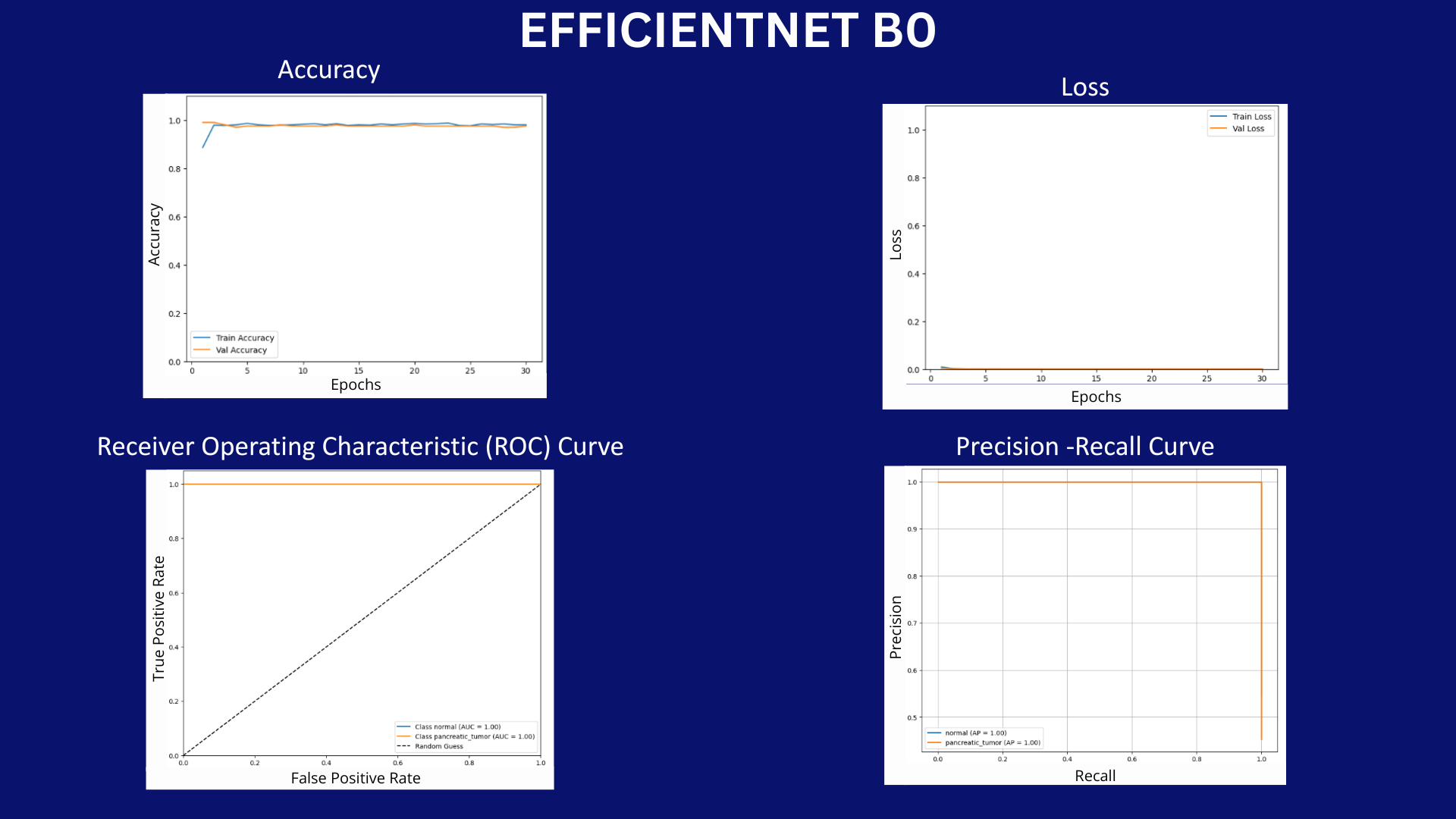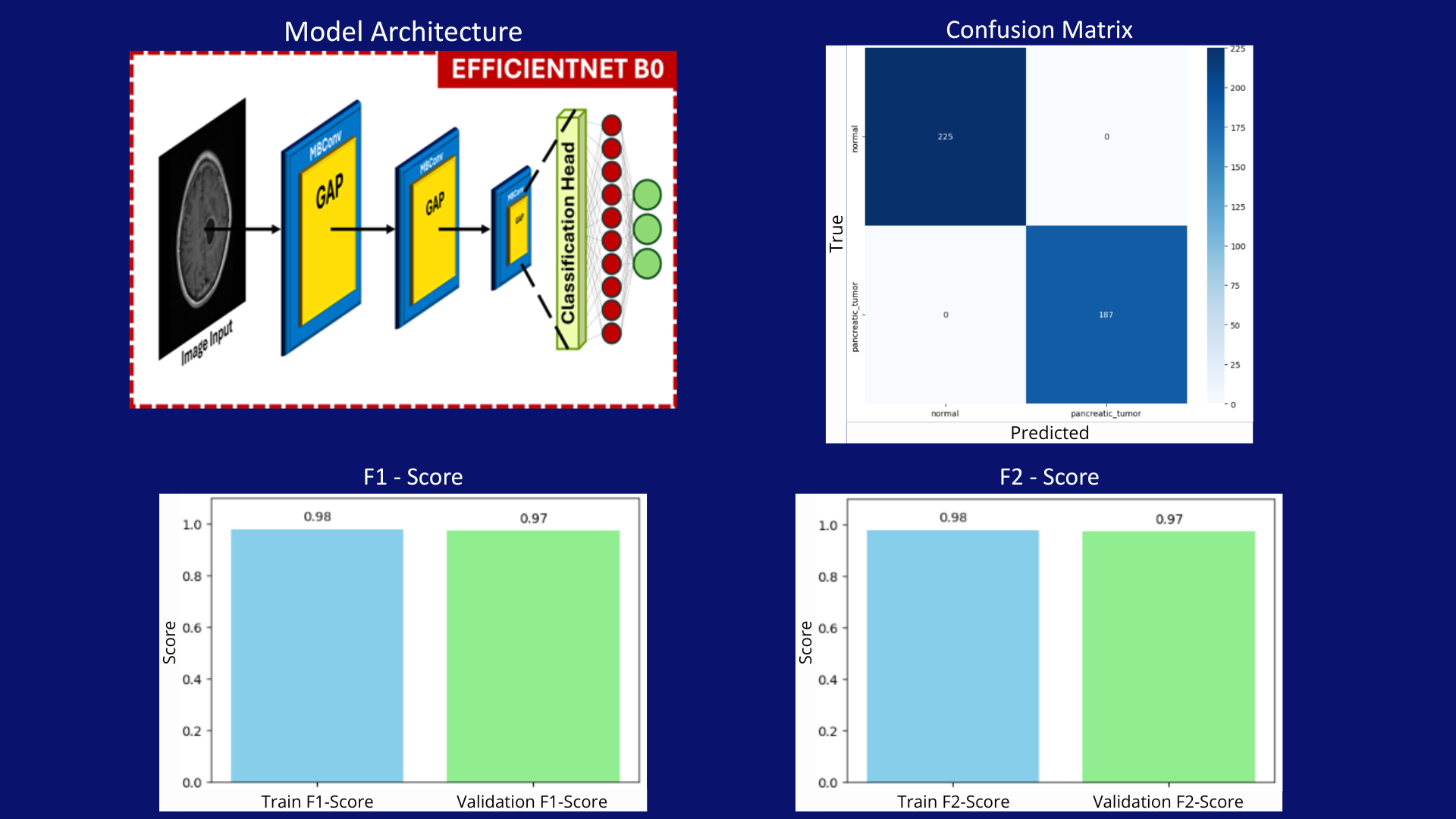Tuesday Poster Session
Category: Biliary/Pancreas
P4317 - Revolutionizing Early Pancreatic Cancer Detection: EfficientNetB0 Embedded in a Universally Accessible, Multiplatform Diagnostic Tool for Mobile Cancer Detection and Equitable Cancer Care
Tuesday, October 28, 2025
10:30 AM - 4:00 PM PDT
Location: Exhibit Hall

Suchith Boodegere Suresh
Montefiore St Luke's Cornwall Hospital
Newburgh, NY
Presenting Author(s)
Award: ACG Presidential Poster Award
Suchith Boodegere Suresh, 1, Ramya Elangovan, 2, Jansi Sethuraj, BSN, RN, CCRN3, Kavin Elangovan, 2, Khutaija Noor, MBBS, FCR4, Elangovan Krishnan, MBBS, PhD, MS5
1Montefiore St Luke's Cornwall Hospital, Newburgh, NY; 2AIM DOCTOR, Houston, TX; 3University of Texas Health Science Center, Houston, TX; 4Amicis Clinical Trials, Hyderabad, Telangana, India; 5AIM DOCTOR, Chennai, Tamil Nadu, India
Introduction: Pancreatic cancer’s grave lethality stems from its silent progression and the inadequacies of current imaging for early detection. Artificial intelligence (AI), especially deep learning, with immense capabilities for evaluation of intricate imaging features is transforming medical diagnostics. EfficientNetB0, a state-of-the-art convolutional neural network, leverages compound scaling to optimize depth, width, and resolution, delivering high accuracy and efficiency. Its application in computerized tomographic (CT) imaging promises a paradigm shift in the early detection of pancreatic malignancy.
Methods: Anonymized CT images of malignant and normal pancreas (n=2060) were split into training (60%), validation (20%), and testing (20%) sets. Preprocessing and augmentation improved data quality and model generalizability. EfficientNetB0 was trained and optimized, with performance evaluated by accuracy, precision-recall, F1-score, F2-score, and area under the receiver operating characteristic curve (AUROC) on validation and test sets. The final model was deployed in a universally accessible, multiplatform application using HuggingFace and Streamlit for global expert validation and real-time support.
Results: Using a rigorously curated anonymized publicly available dataset, EfficientNetB0 demonstrated exceptional performance distinguishing malignant from normal pancreatic lesions. The model achieved exceptional accuracy (99.75%), precision (100% for normal, 100% for cancerous cases), recall (100% for both) and loss curve approached zero. F1-score was 0.98 (training) and 0.97 (validation), with F2-score showing identical values. AUROC reached 99.99%, highlighting the model’s discriminative capacity. The model's high accuracy upon deployment in the multiplatform application provides great potential to augment clinical decision-making in resource limited settings, thereby serving as a tool for equitable cancer care.
Discussion: EfficientNetB0’s high accuracy highlights deep learning’s promise in early pancreatic cancer detection. By extracting nuanced imaging features often missed by clinicians, AI transcends conventional radiology, enabling earlier, more precise diagnoses. Our AI platform’s universal deployment democratizes access to advanced diagnostics, promoting equity in cancer care. For clinicians, integrating AI tools augments decision-making, reduces ambiguity, and may improve outcomes in the management of pancreatic malignancy where timely intervention is critical.

Figure: EfficientNetB0 (Diagnostic Performance)

Figure: EfficientNetB0 (Model Architecture and Diagnostic Performance)
Disclosures:
Suchith Boodegere Suresh indicated no relevant financial relationships.
Ramya Elangovan indicated no relevant financial relationships.
Jansi Sethuraj indicated no relevant financial relationships.
Kavin Elangovan indicated no relevant financial relationships.
Khutaija Noor indicated no relevant financial relationships.
Elangovan Krishnan indicated no relevant financial relationships.
Suchith Boodegere Suresh, 1, Ramya Elangovan, 2, Jansi Sethuraj, BSN, RN, CCRN3, Kavin Elangovan, 2, Khutaija Noor, MBBS, FCR4, Elangovan Krishnan, MBBS, PhD, MS5. P4317 - Revolutionizing Early Pancreatic Cancer Detection: EfficientNetB0 Embedded in a Universally Accessible, Multiplatform Diagnostic Tool for Mobile Cancer Detection and Equitable Cancer Care, ACG 2025 Annual Scientific Meeting Abstracts. Phoenix, AZ: American College of Gastroenterology.
Suchith Boodegere Suresh, 1, Ramya Elangovan, 2, Jansi Sethuraj, BSN, RN, CCRN3, Kavin Elangovan, 2, Khutaija Noor, MBBS, FCR4, Elangovan Krishnan, MBBS, PhD, MS5
1Montefiore St Luke's Cornwall Hospital, Newburgh, NY; 2AIM DOCTOR, Houston, TX; 3University of Texas Health Science Center, Houston, TX; 4Amicis Clinical Trials, Hyderabad, Telangana, India; 5AIM DOCTOR, Chennai, Tamil Nadu, India
Introduction: Pancreatic cancer’s grave lethality stems from its silent progression and the inadequacies of current imaging for early detection. Artificial intelligence (AI), especially deep learning, with immense capabilities for evaluation of intricate imaging features is transforming medical diagnostics. EfficientNetB0, a state-of-the-art convolutional neural network, leverages compound scaling to optimize depth, width, and resolution, delivering high accuracy and efficiency. Its application in computerized tomographic (CT) imaging promises a paradigm shift in the early detection of pancreatic malignancy.
Methods: Anonymized CT images of malignant and normal pancreas (n=2060) were split into training (60%), validation (20%), and testing (20%) sets. Preprocessing and augmentation improved data quality and model generalizability. EfficientNetB0 was trained and optimized, with performance evaluated by accuracy, precision-recall, F1-score, F2-score, and area under the receiver operating characteristic curve (AUROC) on validation and test sets. The final model was deployed in a universally accessible, multiplatform application using HuggingFace and Streamlit for global expert validation and real-time support.
Results: Using a rigorously curated anonymized publicly available dataset, EfficientNetB0 demonstrated exceptional performance distinguishing malignant from normal pancreatic lesions. The model achieved exceptional accuracy (99.75%), precision (100% for normal, 100% for cancerous cases), recall (100% for both) and loss curve approached zero. F1-score was 0.98 (training) and 0.97 (validation), with F2-score showing identical values. AUROC reached 99.99%, highlighting the model’s discriminative capacity. The model's high accuracy upon deployment in the multiplatform application provides great potential to augment clinical decision-making in resource limited settings, thereby serving as a tool for equitable cancer care.
Discussion: EfficientNetB0’s high accuracy highlights deep learning’s promise in early pancreatic cancer detection. By extracting nuanced imaging features often missed by clinicians, AI transcends conventional radiology, enabling earlier, more precise diagnoses. Our AI platform’s universal deployment democratizes access to advanced diagnostics, promoting equity in cancer care. For clinicians, integrating AI tools augments decision-making, reduces ambiguity, and may improve outcomes in the management of pancreatic malignancy where timely intervention is critical.

Figure: EfficientNetB0 (Diagnostic Performance)

Figure: EfficientNetB0 (Model Architecture and Diagnostic Performance)
Disclosures:
Suchith Boodegere Suresh indicated no relevant financial relationships.
Ramya Elangovan indicated no relevant financial relationships.
Jansi Sethuraj indicated no relevant financial relationships.
Kavin Elangovan indicated no relevant financial relationships.
Khutaija Noor indicated no relevant financial relationships.
Elangovan Krishnan indicated no relevant financial relationships.
Suchith Boodegere Suresh, 1, Ramya Elangovan, 2, Jansi Sethuraj, BSN, RN, CCRN3, Kavin Elangovan, 2, Khutaija Noor, MBBS, FCR4, Elangovan Krishnan, MBBS, PhD, MS5. P4317 - Revolutionizing Early Pancreatic Cancer Detection: EfficientNetB0 Embedded in a Universally Accessible, Multiplatform Diagnostic Tool for Mobile Cancer Detection and Equitable Cancer Care, ACG 2025 Annual Scientific Meeting Abstracts. Phoenix, AZ: American College of Gastroenterology.

